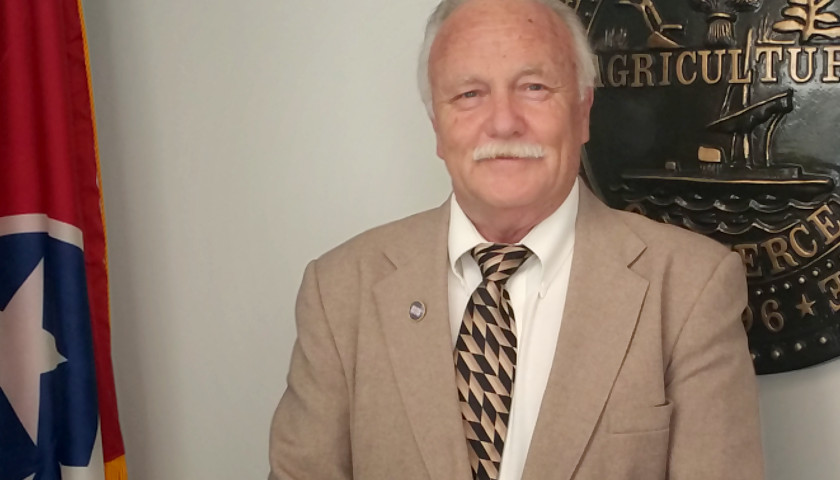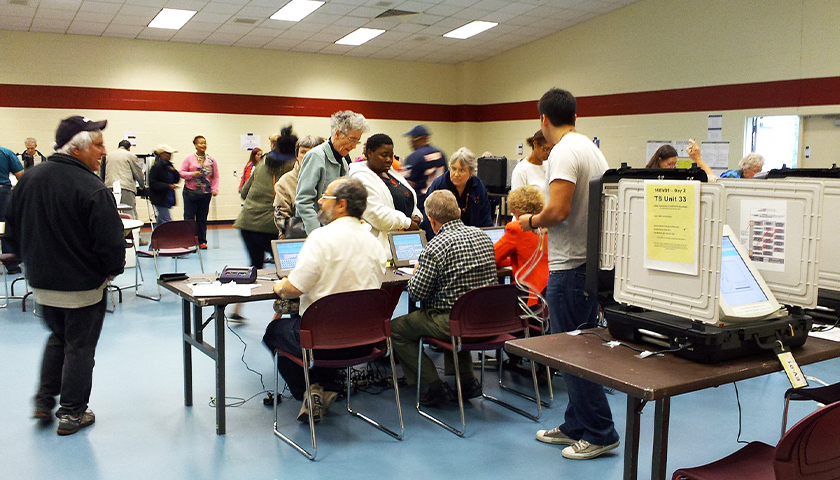A bill that would prohibit a governor of Tennessee from using law enforcement to enforce executive orders that violate constitutional rights advanced in the House State Committee Wednesday.
While the bill will serve to address elements of fascism that could be used in conjunction with executive orders such as those issued for the sake of containing the spread of COVID-19, the eloquent and passionate presentation of the bill by its sponsor Bud Hulsey (R-Kingsport) also serves as a straightforward explanation of what happened over the past two months as well as a lesson in constitutional principles.
Prior to the legislature’s adjournment on March 19 until June, Hulsey’s HB2291 would have amended a portion of the Tennessee Code dealing with the investigations of police officers.
Returning to committee meetings the week of May 25 in preparation for session the week of June 1, Hulsey offered a different amendment to deal with the more contemporary issues related to the handling of COVID-19.
Before explaining the specifics of the amendment that makes the bill, Hulsey said he would have to preface it with some remarks about his perspective on what we’ve been through the last two and a half months in the state.
“I think we have put our Governor in a terrible, terrible, terrible position because the legislature who defined these rails,” said Hulsey as he demonstrated the rails with both his hands, “and set up the system for the governor to operate in.”
Hulsey’s assessment of that system, “I think we’ve done him wrong.”
Using a familiar reference to create a picture for the committee, Hulsey told the members, “We’ve said to the governor, ‘We in the legislative branch, governor, this is what you’re going to do and this is how you do it. All you’ve got to do is say the word emergency three times and click your heels together and we here in the legislature are going to take a magic wand and we’re going to wave it over your head and we’re going to endow you with the power to make law.’”
Making matters worse, Hulsey said the legislature has also essentially said to the governor, “And, if you need the judicial branch to back you up, that’s okay, we don’t mind.’”
Hulsey summarized those scenarios, “Now you’ve got the two branches of government that’s not supposed to be making law, making law.’”
Further elaborating, Hulsey went on to offer a description of events in his straightforward way.
Then we said to the governor, ‘This is what we want you to do next.
We want you to segregate all the people and the businesses in this state into two piles.
One pile we’ll call useful people with useful businesses the other pile are for useless people and useless businesses.
Now, dear Lord, don’t call it that, governor. Use a benign word like essential and non-essential.
And, then when you get them separated governor, this is what you what you need to do next.
You need to ensure that the useful people with useful businesses maintain most of their constitutional protections. So they can go about the way they need to go and do what they want to do and go to work and make a living.
If they have a useful business that’s big enough, you can peacefully assemble a hundred, two hundred, three hundred people in there at one time. It’s no problem.
But, the useless folks with the useless business, we want you to suspend their constitutional protection and that way you can say to them, you shut your door, you go to the house and you stay there until we tell you [that] you can come out.
And the only time we’re going to tell you to come out is if you want to go do business and spend your money at a useful business. The rest of the time, you stay at the house.’
About those useless people without a useful job and needed assistance, Hulsey said, “Draw your check.”
In light of the much-publicized delays the state Department of Labor has had in responding to the significantly increased demand for relief, Hulsey added, “Oh, that check thing, it may be two or three months. The computer system is really backed up. Suck it up. It’s for your own good.”
For the useful folks and useful businesses, Hulsey says their constitutional protections were retained so “We can’t harass them with the police.”
On the other hand, if the useless business and useless people get out of line – using the example of 11 showing up at a prayer meeting on a Wednesday night – the police come to the door and say, “You conform and do what you’re told, or you’ll go to jail for 11 months and 29 days.”
He then asked, rhetorically, “How the heck did we get here?”
In a teaching moment as a retired law enforcement officer, Hulsey then said to his fellow House State Committee members while wagging his finger, “Now, listen, any time you use police power to enforce an executive fiat or decree, that is a form of fascism that this constitution does not recognize and it does not tolerate.”
After a brief but dramatic pause, Hulsey explained that his amendment “doesn’t fix all this mess that we created for the governor,” but admitted that it does need to be fixed so that the governor is never put in “that mess” again.
What the amendment does do, advised Hulsey, “It strips out the fascism out of the three most egregious constitutional areas.”
Very simply, the bill states, “The governor or the chief executive officer of a local government shall not require a law enforcement agency or an officer thereof to enforce a provision of an executive order: (1) Requiring a private business entity to close; (2) Restricting the freedom to assemble peaceably; or (3) Restricting the freedom to travel.”
Hulsey explained the bill this way: “It says you cannot use law enforcement to enforce an edict out of the executive branch that denies people the ability to assemble peaceably, that gives them the right to go to work and earn a living and allows them to move around this state freely without the government infringing on them.”
When Nashville Democrat Representative Harold Love, Jr. questioned Hulsey as to who would enforce executive orders, the bill sponsor responded, “There’s four hurdles you have to get over if you say we have to suspend the constitution because we have a virus.”
Representative Hulsey went on to explain,
Here’s the first one. You can’t tell Tennessee people, look folks the United States Constitution, the State of Tennessee’s Constitution is the law of the land … well kind of. Until you have a virus and somebody dies. You can’t say that.
Here’s the second huge hurdle that you need to get over and that says I don’t think it’s constitutionally legal for the legislative branch in the state of Tennessee to cede to the governor the power to make law. I don’t think we have a right constitutionally to do it. Clarence Thomas has been arguing that for years.
The third big huge hurdle is what all the framers said and they believe. If you go read what they said, my, the men who signed the declaration did not say we pledge our lives, our fortunes and our sacred honor … for public health. They never said that. They said for liberty. Patrick Henry didn’t jump up and say give me health or give me death. The Revolutionary War wasn’t fought over King George depriving us of health and safety. Everything in that whole concept is all bound up in liberty and freedom. So you have to get over that hurdle.
And, I’m getting to your question, but I have to preface it with this.
The fourth hurdle that you’ve got to get over is if you say we’ve got to suspend the constitution but we have a virus and people die. Then, you have to say the greatest American value, the greatest American virtue is health and safety. That’s not what the constitution says. It says that the greatest American value is what it’s always been, and that’s liberty and freedom.
To more directly answer Love’s question, Hulsey said that Tennessee people are not stupid and that if they were told that they could die from the virus and there were certain things they should do if they don’t want to die, they will do it.
“I don’t think you have to violate the constitution and suspend constitutional principles to get Tennesseans to practice safe health and avoid a virus.”
Representatives Bill Beck and Jason Powell, also Nashville Democrats, expressed concerns about the inability of the governor to issue executive orders and use police powers to limit the movement of Tennesseans for things like curfews.
Nashville/Davidson County is one of six that have their own health department and operated under different executive orders than that of the other 89 in the state. Nashville’s restrictions were greater than the rest of the state and also started the reopening process later.
While there was a back-and-forth dialogue between the Nashville representatives and Hulsey about these issues, he mainly maintained his position that police cannot be used relative to enforcement of the three constitutional issues.
Representative Johnny Shaw (D-Bolivar) offered a perspective about the religious community, because of the example of a Wednesday night prayer service. He made the point that church is totally separate and different from government, and that people don’t “go to church,” because church is within an individual. Rather, pointed out Shaw, people go to a house of worship.
A theology major and minister, Shaw made it clear that his congregation didn’t stay home because of anything the governor said or what the legislative body did, but because 65 percent of the congregation have underlying issues.
He concluded, “They have nothing whatsoever to do with the church.”
Majority Assistant Floor Leader Chris Todd (R-Madison County) applauded Hulsey for the bill and the clarity with which he brought it. He said he had the same concern that too much had been put on the shoulders of the governor that should have been on the shoulders of the legislature.
Todd said that he doesn’t believe it’s in the constitution that the governor bear this alone and that it’s not on law enforcement to start interpreting what the constitution says versus the laws that are on the books.
Saying he wouldn’t be nearly as eloquent, Representative Justin Lafferty (R-Knoxville) told Hulsey he would “give it a ride” as he applauded what the bill sponsor is working toward.
“Our country was founded on these principles of freedom and liberty. There are dangers inherent in freedom and liberty. We decided very long ago to make that trade. We will take our chances, as long as we can live our lives and be free and control our own destiny our own futures.”
Lafferty says that things have expanded beyond the current issue.
“It’s becoming a bigger issue in our society as a whole as we continue to cede more and more power to more and more agencies, more and more groups, more and more governmental “quasi-governmental” organizations.”
After expressing appreciation for Hulsey setting the stage for him to make his comments,
Lafferty reflected, “Perhaps in a hundred years, we might look back and see that this is a question of our age that we had to address.”
On a voice vote, HB2291 advanced to the House Calendar & Rules Committee to be scheduled for a floor vote.
The companion Senate bill, SB2368 is sponsored by Senator Mark Pody (R-Lebanon) and has been placed on the calendar of the Senate Judiciary Committee for Tuesday, June 2 at 3:00 p.m. However, SB2368 appears on Calendar 2 of the Senate Judiciary Committee, as opposed to the calendar for “COVID-19, Time Sensitive or Budget Related” bills.
The video of the House State Committee can be viewed here.
– – –
Laura Baigert is a senior reporter at The Tennessee Star.
Background Photo “Tennessee House Floor” by Ichabod. CC BY-SA 3.0.






Such a shame that we even need a law like this but it’s time has come especially with the dictator we call Governor Lee.
Good, I hope it passes. If you want to hole-up in your house because you are high risk or afraid please feel free to do so. Meanwhile, let the rest of us that want to take the risk or need to take the risk to feed our families do so.
How about fixing Tennessee’s huge problem with civil asset forfeiture first???